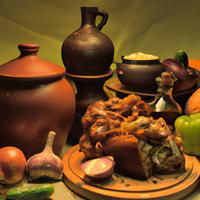
1 serving (200 grams) contains 400 calories, 35.0 grams of protein, 25.0 grams of fat, and 5.0 grams of carbohydrates.

Log this food in SnapCalorie

Nutrition Information
Calories |
470.6 | ||
|---|---|---|---|
% Daily Value* |
|||
| Total Fat | 29.4 g | 37% | |
| Saturated Fat | 10.6 g | 53% | |
| Polyunsaturated Fat | 0 g | ||
| Cholesterol | 117.6 mg | 39% | |
| Sodium | 705.9 mg | 30% | |
| Total Carbohydrates | 5.9 g | 2% | |
| Dietary Fiber | 0 g | 0% | |
| Sugars | 2.4 g | ||
| protein | 41.2 g | 82% | |
| Vitamin D | 23.5 mcg | 117% | |
| Calcium | 23.5 mg | 1% | |
| Iron | 2.9 mg | 16% | |
| Potassium | 470.6 mg | 10% | |
* Percent Daily Values are based on a 2,000 calorie diet. Your daily values may be higher or lower depending on your calorie needs.
Food Attributes
Source of Calories
About Slow cooked pork
Slow Cooked Pork is a tender, flavorful dish prepared by simmering pork over low heat for several hours. This cooking method breaks down tough muscle fibers, resulting in a succulent texture and rich taste. Commonly found in cuisines worldwide, from American barbecue to Asian stews, the dish is often seasoned with herbs, spices, or marinades like soy sauce, garlic, or paprika, depending on regional traditions. Slow Cooking retains moisture and enhances natural flavors without excessive oils. While pork is a good source of protein, it's also high in saturated fats, especially when prepared with fattier cuts like pork shoulder. Adding vegetables and leaner cuts can balance the nutritional profile, and using low-sodium marinades or rubs can reduce excess sodium intake. Slow Cooked Pork is a versatile centerpiece offering indulgent comfort while allowing room for nutritional adjustments within healthy eating practices.



